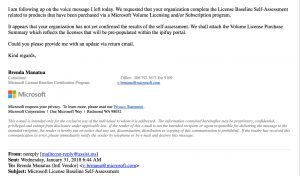After a conversation with my software vendor today, I was told that in 2021 Microsoft will be going full on subscription based. Pricing was not released, nor was a set date. I was only guaranteed it will happen this year and will affect the two major products my company sells and supports (Windows 10 Desktop and Windows server). I am waiting to hear if there is any change in CALs or pricing of CALs since everyone will be moving to subscription based software. Pricing has not been released yet, but looking at the Enterprise subscription of $7 per seat/mo.
In addition, Windows 10 there will be a new version called Windows 10x. Microsoft said 10X won’t run on PCs. Instead, it’s intended for stripped-down computers something like a Chromebook, which would run mostly online software. Another 10X computer intended for small business would be less capable than a PC, but have enough processing power to run its own software.
A consumer Windows 10 subscription service (which would replace purchasing the operating system with a monthly fee to use it) has reportedly been discussed within Microsoft.
The idea is that a Windows 10 subscription fee could become part of Microsoft 365, which is currently the online subscription version of Microsoft Office. But subscriptions may not have much appeal to consumers. Microsoft does have a patent on Windows365 which they acquired at the same time as Office365.
Microsoft’s Email server Exchange 2019 is also the last of 1 time purchases for business. During the Redmond, Wash. company’s Ignite technical conference, held last month, Microsoft announced that the next version of its on-premises Exchange Server — the de facto email server in the enterprise — will be available only as a subscription-based product, thus ending licensing that let customers pay just once for the software.
Other details, notably pricing, were missing. Microsoft said that info will be fleshed out before the release of what it dubbed Exchange Next in the second half of 2021.
That means Exchange Server 2019 will be the last in the line of email servers sold as “perpetual” licenses, those that a company purchases with an up-front payment. A perpetual license payment provides the rights to run the software as long as one wants, even after Microsoft halts support.

